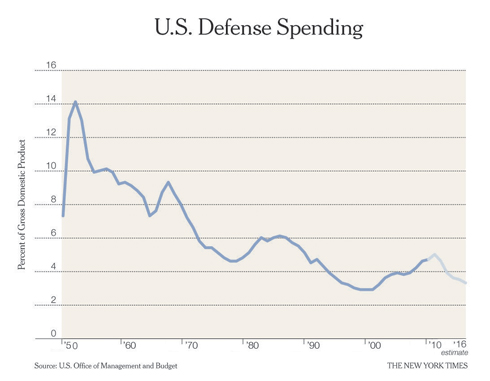I am baffled by the argument that the United States can incur big savings by ending the war in Afghanistan and, more generally, by cutting bloated defense budgets. I’ve mostly been hearing this from liberals, and indeed this is a variation of a debate that has continued for years.
Now, I am not endorsing our current levels of defense spending. The nation’s military buildup following the terrorist attacks of Sept. 11, 2001, was outrageous. The United States was hit by a handful of men wielding box-cutters (or something similar — I am aware that’s not certain), and we responded by buying a lot of heavy tanks and later invading a country that had nothing to do with the attack.
So, yes, the United States spends a lot of money, unnecessarily, on defense. In fact, this is almost surely the most wasteful part of the federal budget, mainly because politicians are afraid to say no to the military for fear of being called unpatriotic. Aside from the question of whether the wars in Afghanistan and Iraq are too expensive to fight — invading Afghanistan made sense in 2001, but I have no idea what we’re doing there now — it has long been clear that the United States military is still warding off threats that haven’t existed since the fall of the Soviet Union.
Get Truthout in your inbox every day! Click here to sign up for free updates.
But despite all that, this fact remains: Defense spending isn’t at the heart of the government’s current budget woes. President Obama’s budget calls for defense spending to decrease slightly to 3.4 percent of gross domestic product by 2016. (By comparison, in the 1950s, defense spending took up half the federal budget.) One could make the case that the number should be closer to 2 percent, but implementing cuts in defense would not help us to avoid being forced to make hard choices in areas like health care.
By all means, the United States should try to crack down on waste in the defense sector. However, we must realize that doing so would be of only modest help in fixing the budget gap. For evidence, look to the graphic on this page showing defense spending as a share of G.D.P. in the United States, according to the government.
If you still can’t see how it’s possible to simultaneously believe that we waste a lot of money on the military and that ending that waste would make only a modest contribution to solving our fiscal problems, then I cannot help you.
Paul Krugman joined The New York Times in 1999 as a columnist on the Op-Ed page and continues as a professor of economics and international affairs at Princeton University. He was awarded the Nobel in economic science in 2008.
Mr Krugman is the author or editor of 20 books and more than 200 papers in professional journals and edited volumes, including “The Return of Depression Economics” (2008) and “The Conscience of a Liberal” (2007). Copyright 2011 The New York Times.
Join us in defending the truth before it’s too late
The future of independent journalism is uncertain, and the consequences of losing it are too grave to ignore. To ensure Truthout remains safe, strong, and free, we need to raise $46,000 in the next 7 days. Every dollar raised goes directly toward the costs of producing news you can trust.
Please give what you can — because by supporting us with a tax-deductible donation, you’re not just preserving a source of news, you’re helping to safeguard what’s left of our democracy.

